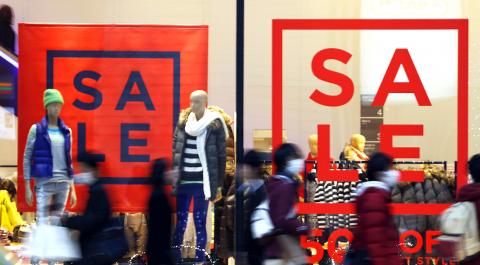Japanese consumer inflation rose 1.2 percent last month, its fastest pace in five years, edging closer to the central bank’s 2 percent target in its war on deflation as Tokyo battles to reverse years of falling prices.
Stripping out volatile food and energy prices, which have largely driven recent increases, prices inched up 0.6 percent in November, the country’s best result since August 1998.
The broader consumer price index, which measures a basket of everyday goods but excludes the cost of fresh food, rose 1.2 percent last month from a year earlier, the fastest pace in five years.

Photo: Reuters
Japanese Prime Minister Shinzo Abe’s government has put conquering deflation and stoking growth in the world’s third-largest economy at the top of its agenda with a policy blitz dubbed “Abenomics.”
The upbeat headline for yesterday’s inflation data was tempered by the fact that prices were still largely driven up by higher fuel bills, not surging demand for everyday goods such as vacuum cleaners and clothes which power the economy as a whole.
Electricity bills jumped a hefty 8.2 percent, the data showed, as Japan’s energy costs soar in the wake of the 2011 Fukushima atomic disaster, which forced the shutdown of the nation’s nuclear reactors.
Since the accident, Japan has been importing fossil fuels to plug the energy gap, a pricey option that has become even more expensive as the yen sharply weakened in the wake of the Bank of Japan’s unprecedented monetary easing drive.
Yesterday’s data showed prices moving towards the Bank of Japan’s ambitious 2 percent inflation target — to be reached in just two years.
While deflation may sound like a good thing for shoppers, it can be bad for growth because falling prices encourage consumers to put off spending, knowing they will pay less for a product if they wait.
That makes it difficult for companies to invest and discourages them from hiking wages, which, in turn, reduces consumer spending further.
Despite Abe’s much-lauded start since sweeping national elections a year ago, analysts have been warning that Tokyo’s bold pro-growth program — a mix of big government spending and central bank monetary easing — is not enough on its own without promised economic reforms.
And getting Japan’s notoriously thrifty households to spend more is a key part of Abe’s drive, as are yet-to-be-seen widespread wage rises.
That was in evidence yesterday with separate data showing Japan’s household spending inched up 0.2 percent in November, well below market expectations, as consumers get ready for a sales tax hike next year.
The rate rise in April — to 8.0 percent from 5.0 percent — is seen as crucial for shrinking Japan’s mammoth national debt, proportionately the worst among wealthy nations.
However there are fears it will derail a budding economic recovery by taking a bite out of consumer spending.
Japan’s factory output, meanwhile, expanded by a weaker-than-expected 0.1 percent in November, while the unemployment rate held steady at 4.0 percent.

Nvidia Corp chief executive officer Jensen Huang (黃仁勳) on Monday introduced the company’s latest supercomputer platform, featuring six new chips made by Taiwan Semiconductor Manufacturing Co (TSMC, 台積電), saying that it is now “in full production.” “If Vera Rubin is going to be in time for this year, it must be in production by now, and so, today I can tell you that Vera Rubin is in full production,” Huang said during his keynote speech at CES in Las Vegas. The rollout of six concurrent chips for Vera Rubin — the company’s next-generation artificial intelligence (AI) computing platform — marks a strategic

REVENUE PERFORMANCE: Cloud and network products, and electronic components saw strong increases, while smart consumer electronics and computing products fell Hon Hai Precision Industry Co (鴻海精密) yesterday posted 26.51 percent quarterly growth in revenue for last quarter to NT$2.6 trillion (US$82.44 billion), the strongest on record for the period and above expectations, but the company forecast a slight revenue dip this quarter due to seasonal factors. On an annual basis, revenue last quarter grew 22.07 percent, the company said. Analysts on average estimated about NT$2.4 trillion increase. Hon Hai, which assembles servers for Nvidia Corp and iPhones for Apple Inc, is expanding its capacity in the US, adding artificial intelligence (AI) server production in Wisconsin and Texas, where it operates established campuses. This

US President Donald Trump on Friday blocked US photonics firm HieFo Corp’s US$3 million acquisition of assets in New Jersey-based aerospace and defense specialist Emcore Corp, citing national security and China-related concerns. In an order released by the White House, Trump said HieFo was “controlled by a citizen of the People’s Republic of China” and that its 2024 acquisition of Emcore’s businesses led the US president to believe that it might “take action that threatens to impair the national security of the United States.” The order did not name the person or detail Trump’s concerns. “The Transaction is hereby prohibited,”

Garment maker Makalot Industrial Co (聚陽) yesterday reported lower-than-expected fourth-quarter revenue of NT$7.93 billion (US$251.44 million), down 9.48 percent from NT$8.76 billion a year earlier. On a quarterly basis, revenue fell 10.83 percent from NT$8.89 billion, company data showed. The figure was also lower than market expectations of NT$8.05 billion, according to data compiled by Yuanta Securities Investment and Consulting Co (元大投顧), which had projected NT$8.22 billion. Makalot’s revenue this quarter would likely increase by a mid-teens percentage as the industry is entering its high season, Yuanta said. Overall, Makalot’s revenue last year totaled NT$34.43 billion, down 3.08 percent from its record NT$35.52